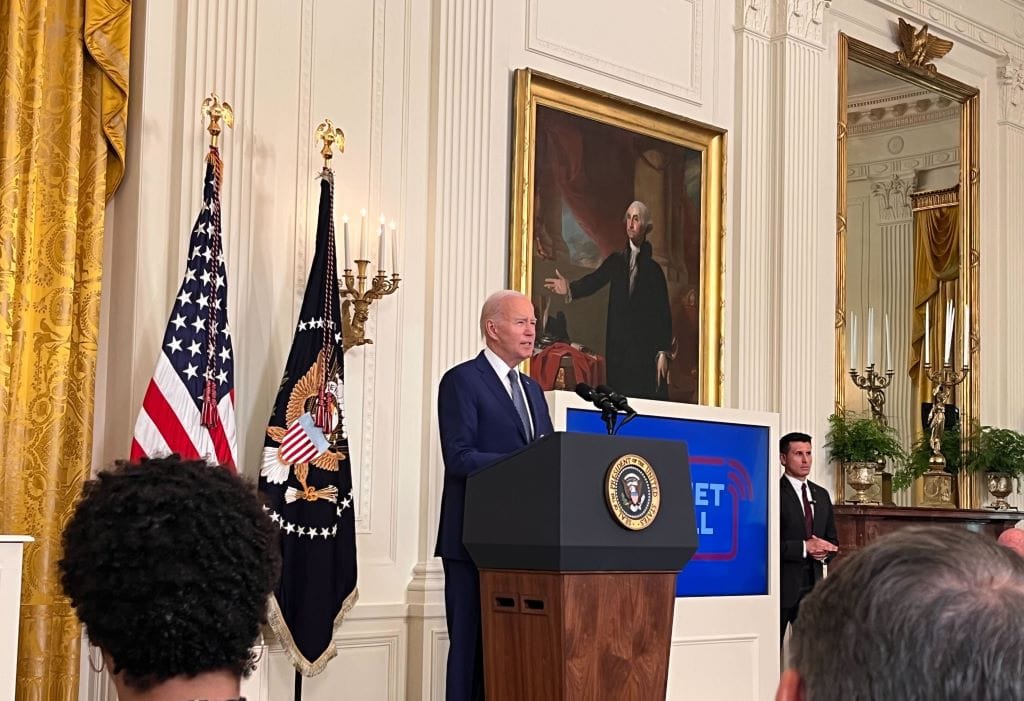BEAD Funding Allocation Announcement Gets High Praise to Begin New Broadband Chapter
Texas is the highest awarded state, as 19 states set to receive more than $1 billion from BEAD.
Teralyn Whipple

WASHINGTON, June 26, 2023 – The Department of Commerce’s National Telecommunications and Information Administration announced Monday the funding allocations through the $42.5 billion Broadband Equity Access and Deployment program.
Texas is the highest awarded state with over $3.3 billion and California the second-highest with $1.8 billion. Nineteen states are set to receive more than $1 billion in funding. Other high awardees include Alabama, Georgia, Louisiana, Michigan, Missouri and North Carolina.
Each state is set to receive a baseline $107.7 million. Allocations were based on the Federal Communications Commission’s second version of its national broadband map.
States will receive their formal notice of allocation on June 30 upon which entities will have 180 days to submit initial proposals for how they will run their subgrant programs. Once plans are approved by the NTIA, states will be able to access at least 20 percent of their allocated funds.
With these allocations, the White House anticipates that each state and territory will have the resources it needs to connect every resident and small business to reliable, affordable high-speed internet by 2030.
Energy was high at the White House Monday when President Joe Biden and Vice President Kamala Harris kicked off the next phase of the administration’s Investing in America agenda with the allocation announcement of BEAD allocations.
“These investments will help all Americans. We are not going to leave anyone behind,” said Biden to applause. Not only will these investments connect more Americans, but they will also provide more high paying jobs and invest in American manufacturing, he continued.
The event, which directly followed the announcement of state allocation funds Monday morning, was attended by broadband leaders across the federal government including NTIA Administrator Alan Davidson, FCC Chairwoman Jessica Rosenworcel and Secretary of Commerce Gina Raimondo.
“This is a watershed moment for the millions of people across the country who lack access to a high-speed internet connection who will soon have this necessary service to learn, work and play,” Davidson said in a statement.
Among the attendees was also Senator Joe Manchin, D-W.V., who was an avid advocate of the program with his work in structuring the $62 billion Infrastructure, Investment and Jobs Act, which funded the BEAD program. His wife, Gayle Manchin, also attended the event.
“As a direct result of my efforts to correct the FCC maps and ensure the funding in the IIJA is distributed according to these maps, West Virginia will finally receive our fair share of resources to build out the reliable service we need,” said Manchin of the awards in a statement.
The event was also attended by state broadband leaders from across the nation who gathered to applaud the president for his work to connect Americans to high-speed internet.
Biden said in his remarks that the goal of connecting all Americans to high-speed internet is “bold” but “nothing beyond our capacity.”
“By investing in America, we produce results,” he concluded.
Biden touted broadband infrastructure investment as the remedy to reverse decades of ‘failed economic policies’ in his remarks.
This “historic investment” to connect everyone in America to high-speed, reliable internet connectivity by 2030 would boost the economy by attracting private investments and providing more people with equitable access to high-paying jobs, Biden highlighted.
“For today’s economy to work for everyone, internet access is just as important as electricity, or water, or other basic services,” he claimed.
This investment would further realize the administration’s vision of “building the economy from the middle out and bottom up,” giving all Americans and small businesses a level playing field in the marketplace. It also helps to stabilize a “reeling” economy, the result of a trickle-down economics in which policies such as tax cuts disproportionately favor the wealthy, claimed Biden.
“I promise to be president for all Americans, whether or not they voted for me or whether or not they voted for these laws,” said Biden. “These investments will help all Americans, we’re not gonna leave anyone behind.”
The BEAD program has been a bone of contention for Republican lawmakers since its initial proposal due to concerns that the fiber-focused program would violate technological neutrality and hinder free competition by favoring union workers.

Commerce Secretary Gina Raimondo at Monday’s event
Positive responses from lawmakers, industry
“Today’s announcement is history in the making. Reliable, high-speed internet is not a luxury – it’s a necessity,” said Frank Pallone Jr., D-NJ. “Americans depend on internet access to do their jobs, run their small businesses, complete schoolwork, and connect with family and friends.”
Colorado Senators Michael Bennet, D-CO, and John Hickenlooper, D-CO, along with Governor Jared Polis, welcomed Colorado’s allocation of over $826 million, highlighting the significance of closing the digital divide. “Thanks to our Bipartisan Infrastructure Law, we’re connecting every household to affordable, high-speed internet so Coloradans can access telehealth services, virtual classes, run their small businesses, and so much more,” said Hickenlooper.
Jim Matheson, CEO of the National Rural Electric Cooperative Association, applauded the allocation announcement, saying “Access to broadband creates new ways to live, learn and earn in rural America. These state allocations are a major milestone in the fight to finally make rural broadband a reality.”
USTelecom and CCIA, trade groups representing broadband and technology firms, praised the administration’s efforts and commitment to bridging the digital divide and expanding internet access.
“All of us in the broadband community applaud the Administration, and in particular Assistant Secretary Alan Davidson and the entire NTIA team, for their tremendous efforts,” said Jonathan Spalter, president and CEO of USTelecom. “Now the states turn to the important work of implementing their grant programs and we will continue to work with them to bring broadband to everyone.”
CCIA Senior Vice President and Chief of Staff Stephanie Joyce said, “This funding brings states closer to making broadband buildout a reality. This connectivity brings better access to information and economic opportunities for Americans while paving the way for companies across industry sectors to continue innovating.”
ACA Connects, representing independent broadband providers, expressed eagerness to work with states to fulfill the BEAD program’s promise and bring high-performance broadband to all Americans.
“With today’s funding allocations, the Biden Administration has taken another major step in bringing high-performance broadband to all Americans,” CEO Grant Spellmeyer said. “The ball is now in the States, and ACA Connects Members – who already offer wireline broadband service to millions of households, including in rural communities – are eager to work with them to fulfill the promise of the BEAD program.”
Oklahoma will receive nearly $800 million to deploy high-speed internet service. Secretary of Commerce Gina Raimondo praised the investment for closing the digital divide.
“Thanks to President Biden’s commitment to investing in America and with Governor (Kevin) Stitt’s leadership, we are bringing Internet to every family, business, and Tribe in Oklahoma,” Raimondo said in the news release. “Access to high-speed Internet is essential for education, healthcare and economic opportunity, and this funding will help close the digital divide once and for all.”
New York State’s ConnectALL office has been allocated over $664 million in funding. This funding will primarily focus on providing fiber optic infrastructure to areas in New York that currently lack broadband service, governor Kathy Hochul said.
“This transformative investment in New York’s ConnectALL program will be a gamechanger in advancing our statewide strategy to make affordable, high-speed internet available to all,” Hochul said. “In today’s economy, reliable broadband access is an absolute necessity, and I thank the Biden administration, Majority Leader [Chuck] Schumer, Sen. [Kirsten] Gillibrand, and New York’s congressional delegation for continuing to prioritize critical infrastructure needs and for supporting our mission to expand broadband to every corner of our state.”
Kentucky has been allocated $1.08 billion specifically for building high-speed internet infrastructure in the state. “In today’s digital age, it’s essential that Kentucky’s communities, from rural towns to urban centers, have access to reliable and affordable high-speed internet,” said Senate Republican Leader Mitch McConnell, R-KY, in a press release. “Today’s federal funding will deploy internet infrastructure to communities across the Commonwealth that need it most, bringing new opportunity to millions of Kentuckians.”
Delaware has received $107 million in federal funding. Governor John Carney and Lt. Governor Bethany Hall-Long emphasized the importance of broadband access for education, job prospects, and overall success and well-being.
“Somewhere in Delaware right now there’s a child without access to online educational learning; a mom without a job and no way to research prospects; and a neighbor with no way to check in on their extended family,” Hall-Long said. “That should never be anyone’s reality. Like a digital railroad track, broadband internet access is the connector to jobs, opportunities, and support away from home. This recent investment in high-quality broadband is just another way to close the digital divide and ensure every Delawarean is successful and thriving.”
Michigan is set to receive over $1.5 billion through the BEAD Program to expand high-speed internet access and digital equity to over 200,000 unserved and underserved Michiganders. Democrat Governor Gretchen Whitmer emphasized the economic opportunities and improved access to education and healthcare that this investment will bring.
“Today, we have won a game-changing investment to expand access to reliable, affordable high-speed internet to 210,000 more homes across Michigan,” said Whitmer. “We are focused on helping anyone ‘Make it in Michigan,’ with a comprehensive view on economic development that wins projects, invests in people, and revitalizes places. Today’s win will expand economic opportunity for Michiganders and build on the over $700 million in high-speed internet federal funding we have leveraged and $249 million we invested with the bipartisan Building Michigan Together Plan last year. Let’s keep working together to connect more families and small businesses to fast, reliable high-speed internet that meets their needs, lowers their costs, and grows our economy.”
The Communications Infrastructure Contractors Association expressed support for the funding allocations. “Today is another milestone step in the process to ready the states and territories for the deployment of this generational BEAD funding investment,” said President and CEO Todd Schlekeway.
While the Wireless Internet Service Providers Association said in a statement that the announcement marks an “important milestone” and “much work has been accomplished to get the $42.5 billion plan to this point…much work lies ahead.”
“Important details remain, however, which require ironing out for BEAD to quickly and efficiently realize its goals,” said David Zumwalt, president and CEO of the industry association. “All solutions should be on the table. Pernicious and wasteful overbuilding must be strenuously avoided. Access to the state grant process should work to truly invite small players so more answers can be brought to bear on this national challenge. Clarifying these and other matters will improve the program for all involved, especially those who lack broadband.”
With files from reporters Quinn Nghiem and Enoch Eicher.








